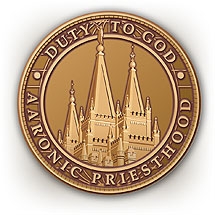When a young man of the Church of Jesus Christ of Latter-day Saints, or Mormon Church as it is sometimes called, turns fourteen years of age and is found worthy he will be ordained to the office of a ‘Teacher.’ This is the second office in the Aaronic Priesthood. As a teacher the young man will retain the duties and responsibilities he had as a deacon (12-13 years old) and will gain new ones.
 At this same time he will be given a new Duty To God booklet, designed especially to help the teachers progress from their duties as a deacon.
At this same time he will be given a new Duty To God booklet, designed especially to help the teachers progress from their duties as a deacon.
One of these new duties is the opportunity to prepare the sacrament, just as the Savior did for His disciples (see Luke 22:19-20). The young man will also have the chance to become a home teacher in the Church, and with a partner will be in charge of visiting assigned families in their homes to ensure their well-being.
Each young man is required to accomplish a certain amount of goals in several different areas in order to receive a certificate at the end of his two years as a teacher. The first area involves Family Activities.
For a teacher there are a total of eight goals, and each one must be completed. These goals vary from memorizing the words and learning to conduct at least three hymns each year, to learning to prepare and use a simple budget, then keeping that budget for at least two months. Parents are asked to work alongside their young men in order to help them accomplish these goals, and must sign them off as they are completed.
The next area is referred to as Quorum Activities. A quorum is the individual classes for deacons, teachers and priests (all callings within the Aaronic Priesthood). There are seven goals in all, each of which must be completed under the direction of class leaders. These goals include participating in at least one quorum service project each year. They are also encouraged to give at least one 4-5 minutes talk in their class or in the Latter-day Saint Church’s main meeting (sacrament meeting).
In the next area, Personal Goals, four new categories are set up for the young man to work on himself. In each of these four categories a requirement of eight goals apiece is put in place, totaling 32 goals for this one area.
The first category is spiritual development. We believe every young man should focus on his spiritual side, to help strengthen it and, at the same time, him. Some of the goals set up to help in this effort are to write regularly in a journal for three months, to regularly add to his mission fund in preparation to become a full-time missionary, and to develop a list of ten qualities he admires in his father or another adult and then to discuss them.
The second category is physical development. Some of the goals here include hiking for nine miles in one day (can be combined with scouting), teaching a younger sibling or member of his congregation how to play an indoor game or sport, and maybe teaching first aid skills to a family or class member. Not only can these things help develop a young man’s physical health, but it goes a long way toward helping his mental and emotional health as well.
The next category involves developments in his career, his education and his personal life. These goals are intended to help a young man become more self-reliant, such as taking a vocational interest test to help him prepare for a potential career. Some goals encourage him to develop his talents, such as learning to play a musical instrument. Other goals help create leadership qualities, such as attending a career night where the steps he will need to apply for a job are described.
The last category focuses on his citizenship and social development. These goals attempt to bring a young man’s focus outside of himself and look toward his community. For example, he could visit a legal court, and share his impressions of the experience with a leader. Or he could discuss ways to help prevent crime in the area. A frequent favorite of youth is to plan and participate in an etiquette dinner.
The Duty to God Service Project can be doubled as an Eagle Scout project if the young man is participating in both programs. These service projects should benefit their family or community and should be planned and carried out by the young man.
Last we come to keeping a Personal Journal. Back in spiritual development one of the goals set there was to keep a journal. You can see how these goals can entwine, helping to accomplish more than one at once.
For example, one goal is to give a talk, while another is to use a computer to prepare a talk. Yet another goal is to give an assigned talk or give a speech at school. These three goals can easily be combined.
There may be times the thought of making and accomplishing all of these goals will feel daunting, but it can be done. With a good support system many young men of this Church have been successful in gaining the certificate at the end of their two years as a teacher. Not only that, but they feel better about themselves, about all they have accomplished, and know that many people out there want to see them succeed.

